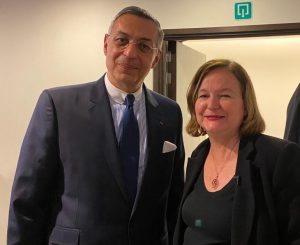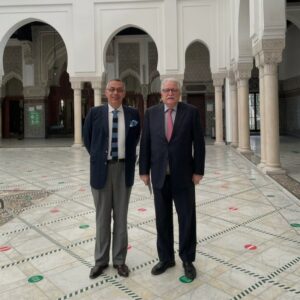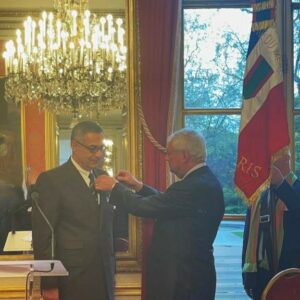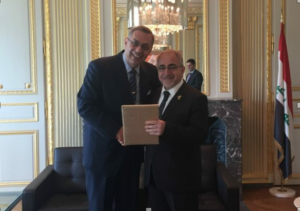
The results of Bahrain’s parliamentary elections on Saturday are a foregone conclusion, which is largely a product of continued oppression by the ruling al Khalifa family against any meaningful challenges to its absolute authority. The government, propped up both politically and financially by the small country’s Persian Gulf neighbors, has shut down the political groups who could have mounted any serious number of votes, banned their members from politics, and jailed dissident clerics, activists, human rights defenders, journalists, and lawyers.
The island state has a long history of having its majority-Shia population (estimated to be between 60% to 65% of the population) governed by Sunni rulers, despite its historical ties with Iran that go back centuries. Intent on keeping the Sunni al Khalifa government secure, purportedly against increasing Iranian influence in the region, Saudi Arabia remains heavily involved in the country’s domestic politics. And the ruling family is in close collaboration with the Gulf countries to keep Bahrain firmly under their control: in 2011, when Bahrain’s Arab Spring protests put the largely-underprivileged Shia in confrontation with the government’s security forces, Saudi Arabia and the United Arab Emirates sent troops across the 25 km-causeway linking the small island to the Saudi mainland to help put them down. In 2017, Bahrain cut ties with Qatar as part of the Gulf crisis, and in October of this year, Saudi Arabia, Kuwait, and the United Arab Emirates pledged $10 billion in aid to support Bahrain’s economy.
Furthermore, the government in Bahrain has been engaged in demographic engineering to shift the sectarian breakdown to their advantage. Unlike most other Gulf countries, Bahrain accepts Syrian refugees (who are overwhelmingly Sunni) and hires scores of Sunnis from countries like Pakistan, Yemen, and Jordan into their security forces, all of whom are put on a fast track to citizenship.
Considering the United States’ blank check to Saudi crown prince Muhammad bin Salman, and the presence of both American and British navy bases in Bahrain who benefit from stability and good relations with the ruling family, there is no reason for the al Khalifas to worry about international reprehension for their actions. Nonetheless, they promote a rosy PR narrative abroad, such as portraying themselves as bulwarks against Iranian attempts to expand influence, downplaying the Shia community’s size and grievances, and appointing a Jewish female lawmaker as ambassador to the United States.
Meanwhile at home, the heavy-handed crackdown on opposition and dissidents continues. Al Wefaq, Bahrain’s largest opposition group who is led by a Shia cleric and who controlled nearly half the parliament in 2010, is only one of the political groups who has been dissolved and its members banned from politics. The Shia cleric who leads al Wefaq, Ali Salman, was tried for accusations of collaborating with Qatar. Hundreds of Bahraini dissidents have been stripped of their citizenship in 2018 alone. Despite being acquitted of charges against him early in the summer, Salman was sentenced to life in prison just three weeks before the election in a move likely to further intimidate any opposition to the government.
It is against the backdrop of these aggressive policies that Saturday’s elections took place. Holding elections in this atmosphere is nothing more than a charade that only helps promote its image, while it is impossible to lead to real change or reflect the genuine political will of the Bahraini people. It is for this reason that al Wefaq called for a boycott of the elections. While the government is touting a voter turnout rate of 67% on Saturday (identical to the 2010 election’s turnout rate and significantly higher than 2014’s 52% when al Wefaq had also boycotted), al Wefaq disputes this number and claims that the real number is just under 30%.
The reality is that the perceived lack of legitimacy of the elections and continued oppression of the Shia will only push them closer to Iran as they are increasingly frustrated and look outside the country for support. Meanwhile, Iran is reanimating a narrative to reassert control over Bahrain. It has long laid claim to the island, and there are several reports that it is exploiting the frustration of the Bahraini Shia and at the very least training militants in Iran and Iraq to carry out attacks against targets. “I did it because people on our side were killed as well,” said one prisoner who had been arrested for conducting attacks on police patrols. With Iran’s use of a narrative of fighting oppression, the oppressed in Bahrain become easy targets for their co-religionists. And as long as legitimate grievances continue to not be addressed, those affected by the grievances, both violent and non-violent, will be driven straight into Iran’s arms. Thus, ironically, the real threat of strengthening Iran’s influence in the country actually comes from none other than the al Khalifa government and its Persian Gulf Sheikhdom supporters.
By Ardavan Amir-Aslani
*Ardavan Amir-Aslani is a member of the Paris Bar and an analyst of the geopolitics of the Middle East.


























